Inducing Affective Lexical Semantics in Historical Language
Paper and Code
Jun 21, 2018



The emotional connotation attached to words undergoes language change. In this paper, we aim at estimating the emotion which is associated with a given word in former language stages of English and German. Emotion is represented following the popular Valence-Arousal-Dominance (VAD) annotation scheme. While being more expressive than polarity alone, existing word polarity induction methods are typically not suited for addressing it. To overcome this limitation, we present adaptations of two popular algorithms to VAD. To measure the effectiveness of these methods in diachronic settings, we present two small gold lexicons for historical word emotions which where annotated by scholars with proficiency in the respective language (stage). In contrast to claims in previous work, we find that limiting the training set to words of supposedly stable emotional meaning does in fact decrease performance, rather than boosting it. This contribution thus elaborates algorithmic and experimental results which form the basis of some of our later publications (Buechel et al., 2017; Buechel and Hahn, 2018; Hellrich et al., 2018) yet had to be skipped there, partly for brevity, partly for a change in focus of our work.
 Add to Chrome
Add to Chrome Add to Firefox
Add to Firefox Add to Edge
Add to Edge